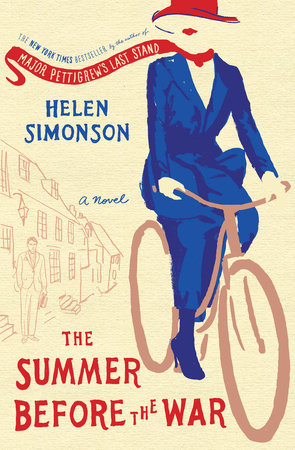The author of Major Pettigrew’s Last Stand returns with another delightful comedy of manners set in England in 1914, the summer before World War I began. The Summer Before the War is set in Rye, a small town in southeastern England, where class differences and romantic intrigue arrive just in time for readers lamenting the ending of Downton Abbey. The novel isn’t as slapstick, laugh-out-loud a tale as Pettigrew was – after all war is at hand and it’s impossible to ignore. Instead, Summer offers Beatrice Nash and a cast of appealing characters who mirror the changes arriving on England’s shore.
Beatrice arrives in Rye to teach Latin at the local
grammar school where a woman has never taught such a serious subject before.
Her champion, the childless Agatha Kent, a 45-year-old pillar of the community,
is a strong woman who nevertheless believes women should not step outside their
assigned societal roles. She and her husband, a quiet London military officer,
have two nephews who greet Agatha when she arrives. Hugh is a surgeon in
training and Daniel is a poet hoping to start a literary journal in Paris.
When another candidate for Beatrice’s teaching position,
a male with strong local ties, threatens Beatrice’s new job, the cash-strapped
Beatrice is concerned.
She
had declined one other teaching offer in favor of Rye. A northern mill town had
offered just the productive life, the challenge of public service that she
craved, but her heart had failed her at the thought of soot-blackened streets
and rows of tenement cottages running across the hills. She had been forced to
laugh at her own hypocrisy in choosing seaside Sussex over the surely greater
education impact she might make among the children of factory workers. Now she wondered if she would have time to
write again and ask them to reconsider her. If not, she might eke out a few
weeks at a friend’s home near Brighton, but her chances of finding some other
position immediately were not good. She had no romantic notions of becoming a
parlor maid or an actress and she had never had patience with those more
literary heroines who solve their problems with a knife or an oncoming train.
The school’s board was expecting her to speak to them.
She
would face the Board of Governors with her very best smile and a forthright
presentation of her skills and qualifications.
She would not let them see that she knew the answer was already decided.
They would pick the man over her, but she would make sure they knew in their
hearts, that she was the better candidate.
Beatrice is able to teach and one of her best students, a boy called Snout,
is a winning half-Gypsy boy, a Roma, who stands in for the racial and class
prejudices of the times. His service in the war illustrates how class
barriers were breached when everyone served side by side in the trenches.
Rye has long been an acclaimed literary town. Henry James,
Rudyard Kipling, and Edith Wharton were among the many authors who lived and
wrote there. Simonson fictionalizes James in the person of Mr. Tillingham, an officious
American author living in the town, just as James himself used his own friends
and neighbors' foibles and characteristics in his novels. Like James, himself,
the fictional Tillingham is a leader in the local effort to welcome and house
Belgian refugees despite some local concerns. England took in 250,000 Belgian
refugees during World War I, so Rye with its close-to-the-coast location would
have taken in many. The refugees bring more drama and humor to the novel. When
the refugees arrive, Hugh tells Beatrice, “We have a number of large families
who understandably do not wish to be parted. Meanwhile many well-meaning ladies
have made meticulous arrangements to take in one or two guests each. Ironic
that families who cleaved together through German brutality may be force
asunder by English charity.”
Mrs.
Fothergill, a local force of nature, is upset that the town hasn’t received children
as she’d requested. Hugh tells her, “We managed one or two, but as you can see
they came with parents and grandparents attached, and they were unwilling to
part with them.” Mrs. Fothergill further laments the lack of more genteel folk noting
that “it is quite impossible to ask our ladies to take absolute peasants into
their own houses, however charming their wooden clogs.”
Once
the war begins, both Hugh and Daniel enlist along with almost all of England’s young
men. Simonson carefully navigates the novel into the more thoughtful wartime period
while continuing her light touch and wry humor.
Summing
it Up: Downton Abbey fans will thrill to this Jane Austin-like treatment of 1914
England as war looms. Heroine Beatrice Nash is
Elizabeth Bennet on a bicycle carrying her teaching credentials and a
determination to earn her own way. Read this thoughtful ode to enter the bright,
promising summer before the war where you’ll emerge both entertained and
educated.
Rating:
5 stars
Category:
Fiction, Five Stars, Grandma’s Pot Roast, Pigeon Pie, Super Nutrition, Book
Club
Publication date: March 22, 2016
Author Website: http://helensimonson.com/
Interview with the Author: The Diane Rehm Show:
http://thedianerehmshow.org/shows/2016-03-22/helen-simonson-the-summer-before-the-war
What
Others are Saying:
Minneapolis Star Tribune: http://www.startribune.com/review-the-summer-before-the-war-by-helen-simonson/372980881/
Publishers Weekly: http://www.publishersweekly.com/978-0-8129-9310-3
Seattle Times: http://www.seattletimes.com/entertainment/books/a-woman-of-substance-in-the-summer-before-the-war/
Shelf Awareness: http://www.shelf-awareness.com/issue.html?issue=2702#m31592

No comments:
Post a Comment